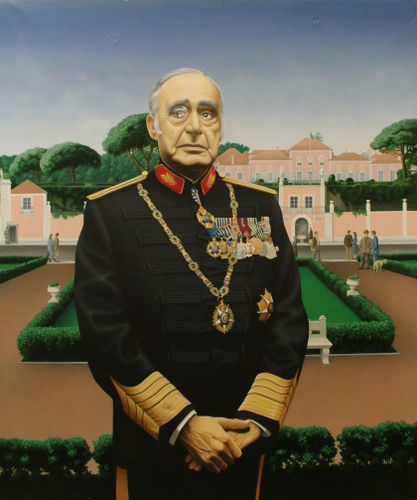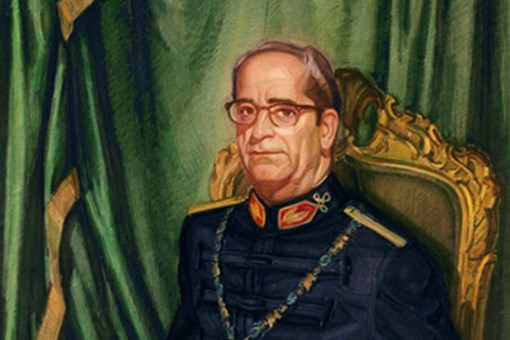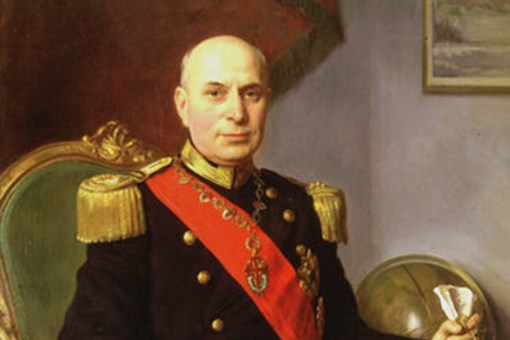António Sebastião Ribeiro de Spínola
Born on 11 April 1910 in Estremoz, Alto Alentejo, died on 13 August 1996 in Lisbon.
Son of António Sebastião de Spínola and Maria Gabriela Alves Ribeiro de Spínola. Scion of a wealthy family: his father was Inspector-general of Finance and Salazar’s chef de cabinet in the Finance Ministry.
He married Maria Helena Martin Monteiro de Barros in 1932.
ACADEMIC CAREER
Entered the Military School (Colégio Militar) in Lisbon in 1920 for his secondary education which he completed in 1928.
In 1928 he attended the Escola Politécnica de Lisboa (Lisbon Polytechnical College).
POSITIONS HELD PRIOR TO THE PRESIDENCY OF THE REPUBLIC
Initially placed in the 4th Cavalry Regiment in 1928, he served as instructor for six years at the 7th Cavalry Regiment, after 1937, with the rank of second-lieutenant. In 1939, he served as aide-de-camp of his father-in-law General Monteiro de Barros, the commandant of the Guarda Nacional Republicana (National Republic Guard), and began working in Revista de Cavalaria, a magazine co-founded by him.
In 1941 he joined a study mission of the Portuguese Army on a visit to the German Armoured Vehicle School and to the German-Russian front.
In 1947 he was appointed for a study mission at the Spanish Guardia Civil, as he was working with Guarda Nacional Republicana.
In 1961 as lieutenant-colonel he acted as 2nd commander and commander of the 2nd Lancers Regiments.
When war broke out in Angola he volunteered and organized Cavalry Group 345. He was posted to Angola with his unit in 1961 and for a short while attended an operational improvement course at the Grafanil Military Instruction Centre in Luanda. His first mission is in the Bessa Monteiro region and then in the frontier region of São Salvador do Congo. He remained in Angola until 1963.
In 1967 he was appointed 2nd general-commandant of the Guarda Nacional Republicana.
In 1968 he was appointed governor and commander-in-chief of the Armed Forces in Guinea, to which positions he was re-appointed in 1972; he turned them down alleging lack of support on the part of the central government.
In November 1973, in an attempt to place him within the regime, he was invited by Marcelo Caetano to become Minister of the Overseas Territories, which he refused. On 17 January 1974 he was appointed Vice Chief of Defence Staff on the suggestion of Costa Gomes, from which position he was dismissed in March for refusing to take part in the demonstration supporting the government and its politics.
On 25 April 1974, as representative of the MFA (Movimento das Forças Armadas – Armed Forces Movement), he accepted the rendition of the Government from Marcelo Caetano, President of the Council, in practice signifying a transfer of power.
With the institution of the Junta of National Salvation, which now held the attributions of the State’s fundamental bodies, which he presided, he is chosen by its members to become President of the Republic.
He occupied the Presidency of the Republic from 15 May to 30 September 1974, when he resigned and was replaced by General Costa Gomes.
MAIN WORKS PUBLISHED
Por Uma Guiné Melhor, 1970; Linha de Acção, 1971; No Caminho do Futuro, 1972, and Por Uma Portugalidade Renovada, 1973, works in four volumes.
Portugal e o Futuro, published in 1974.
Ao Serviço de Portugal, published in 1976.
País sem Rumo, published in 1978.
In the opinion of Ambassador Nunes Barata, who worked closely with him, Marshal António de Spínola will go down in our history as the symbol of transition from the authoritarian regimes of Salazar and Caetano to a pluralist democracy. An incontrovertible truth.
Admired by some, hated by others, in the end he was considered a good soldier but a bad politician.
An Army man whose military career took place mainly during the New State.
He first stood out in 1961 with the start of the war in Angola, where he went as a volunteer.
In Angola he realised that only a political and not a military solution would win the guerrilla warfare and gradually made his positions known to the Government.
This he did in Guinea, when acting as Governor-General. Slowly he defended the idea of setting up a federation that could be applied to the overseas territories.
His book, Portugal e o Futuro, expressed these ideas quite well.
These were ideas of transition, given that they did not consider the possibility of making the overseas territories totally independent.
Brought up under the regime, where one of its main pillars was the colonial empire, he was never fully able to get past this.
The attitudes he took after 25 April show how unadapted he was. His resignation from the Presidency of the Republic following the failed coup of the so-called "silent majority" on 28 September 1974 and his involvement in the attempted military coup of 11 March 1975 are good examples.
It was also as a man of transition that he accepted the transfer of powers from Marcelo Caetano. This situation is similar to that occurred after the 28 May military coup when another soldier, Mendes Cabeçadas, accepted the transfer of powers from the hands of President Bernardino Machado. Although not a democrat by training, Spínola nevertheless helped start the democratic process in Portugal.
The important role he played was officially acknowledged on 5 February 1987 by Mário Soares, President of the Republic, who installed him as Chancellor of the Ancient Military Orders and gave him the insignia of the Grand Cross of the Military Order of the Tower and Sword for his "feats of military and civic heroism and for being a symbol of the April Revolution and the first President of the Republic after the dictatorship”.



